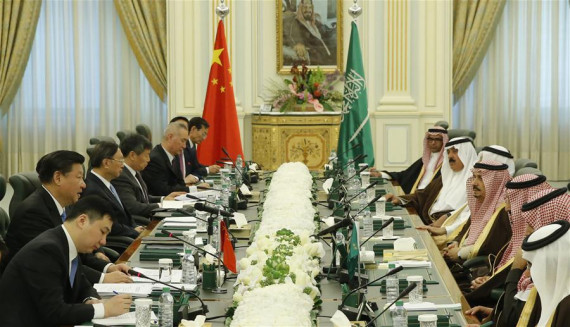
Chinese President Xi Jinping (2nd L) holds talks with Saudi King Salman bin Abdulaziz Al Saud (3rd R) in Riyadh, Saudi Arabia, Jan. 19, 2016. Xi arrived here on Tuesday for a state visit to Saudi Arabia, the first stop of his three-nation tour of the Middle East. (Photo: Xinhua/Ju Peng)
China and Saudi Arabia agreed to lift their bilateral ties to a comprehensive strategic partnership on Tuesday, eyeing more industrial capacity cooperation.[Special coverage]
The two countries signed a Memorandum of Understanding in industrial capacity cooperation after Saudi King Salman bin Abdulaziz Al Saud held talks with visiting Chinese President Xi Jinping. The document also said they will jointly pursue the China-proposed "Belt and Road" initiative.
"I believe it will deepen the mutual strategic trust, lead to greater achievements in our mutually beneficial cooperation, and help facilitate and broaden our shared interests in international and regional affairs," Xi said on the upgrading of the bilateral ties.
The King said that the two peoples will benefit from the elevated ties and that Saudi Arabia supports the "Belt and Road" initiative.
The "Belt and Road" initiative refers to the Silk Road Economic Belt and the 21st-Century Maritime Silk Road, proposals put forward by Xi in 2013 to boost interconnectivity and regional development.
The Chinese president arrived in Saudi Arabia Tuesday on the first stop of his three-nation tour of the Middle East, as the world's second-largest economy seeks closer political and economic ties with the region.
It is the first state visit by a Chinese head of state to Saudi Arabia in seven years. Xi will also travel to Egypt and Iran on his first overseas visit this year that lasts from Jan. 19 to 23.
The two leaders agreed to boost strategic communication, maximize the synergy of their development plans, build a stable long-term energy cooperation, and promote dialogues between the civilizations.
They also pledged to build the China-initiated Asian Infrastructure Investment Bank into a win-win financing platform whereby regional interconnectivity can receive a boost.
The two leaders said they appreciate the progress made in the China-Gulf Cooperation Council Free Trade Area talks, and agreed that the free trade area should be established as early as possible.
The two countries signed a slew of cooperation deals after the talks between their leaders, covering sectors such as energy, communications, environment, culture, aerospace, science and technology.
The Chinese president was awarded the King Abdulaziz Medal by Salman, the highest order in Saudi Arabia.
Saudi Arabia is China's biggest global supplier of crude oil and its biggest trading partner in West Asia and Africa. In 2013, China became the biggest trading partner of Saudi Arabia for the first time.
Two-way trade reached 69.1 billion U.S. dollars in 2014, growing by 230 times over that of 1990 when the two countries established diplomatic ties.


















































